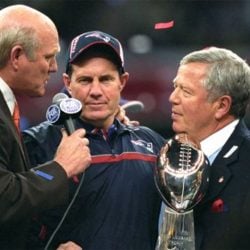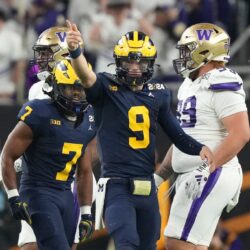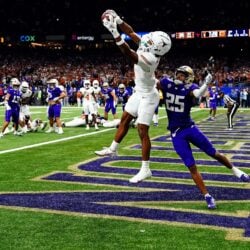
At the conclusion of the 1993 NFC Championship Game at Texas Stadium, Greg Gumbel and Terry Bradshaw closed the CBS broadcast in tears. And with good reason.
A 37-year tradition was coming to an end. If the Jets winning Super Bowl III topped the NFL "unthinkable" list, what happened with network negotiations that year came close to topping that landmark event. In a completely shocking move, the upstart Fox network, who came on the scene with 21 Jump Street in 1986 and was known primarily for The Simpsons overtaking The Flintstones as the longest running primetime cartoon in television history, outbid CBS for rights to the NFC games beginning in 1994. That meant that the long broadcasting bloodlines that went back to Chris Schenkel were about to become permanently severed.
It was stunning for several reasons. How many New England fans grew up Giant fans before the Patriots began to emerge? All those Giants games were on CBS. That aside, breaking a tradition that went all the way back to 1956, a tradition which seemed as secure and as comfortable as Walter Cronkite, was by itself. But to have that tradition broken by Bart Simpson's surrogate parents seemed to be total sacrilege.
CBS knew exactly what was going on. This wasn't a snooker job. What really helped drive CBS into the ground were the idiotic $1 billion television deal they signed with MLB in 1990, and two low-rated Winter Olympics (Albertville 1992, Lillehammer 1994). These two events combined prevented CBS from outbidding Fox for television rights to the NFC for 1994 and beyond. CBS was stuck with their baseball deal, as well as one more Winter Olympics (Nagano 1998), while Fox moved straight ahead with their plan to show the world that they were a major player on the sports television scene.
Fox quickly raided CBS and NBC for key personnel, including executive producer Ed Goren, Pat Summerall, John Madden, Bradshaw, James Brown, and eventually Cris Collinsworth. Gumbel moved over to NBC. With Brown in the studio anchor booth, and with Summerall and Madden as their lead act to help give the network instant credibility, Fox hit the ground running. They made an immediate impact with such innovations as the "Fox Box" (the score and game info at the top left of your screen), sound effects, and a more hip approach to covering the game.
NBC held on for four more years, but would then yield their 32-year hold on the AFL/AFC after the 1997 season, largely due to their huge monetary investments in the NBA and the Summer Olympics. CBS swarmed all over the AFC package, and was back in the NFL business beginning with the 1998 season. Gumbel came back to CBS, who took Phil Simms away from NBC. Gumbel and Simms would become the top crew. Nobody came to CBS from Fox.
Which helps explain why, over the years, CBS seems to favor the NFC despite being the network of the AFC. Like it or not, in the eyes of network personnel, the NFC is the more attractive conference to cover in the NFL. CBS got back into the NFL just to get their foot back in the door. But they are still stinging over losing the NFC ten years ago, and their coverage still suggests that this network wishes it were covering the NFC.
And this really isn't about the perceived bias against the Patriots. It's very clear that Dan Marino wears his Dolphin aqua on his sleeve. Deion Sanders usually can't believe it when the Patriots do well (observe his deep disappointment when the Patriots shut the Steeler running game down in the AFC Championship Game 2 years ago). Boomer Esiason and Jim Nantz generally remain neutral when it comes to the Patriots, though Nantz is given frequently to pick against the Patriots in their weekly predictions.
What this is about is why most of their pregame features are about NFC teams and players and issues. Why, on the final Sunday of the year, when playoff berths in both conferences are being decided, their live studio guests are members of the Philadelphia Eagles and the concern is over the NFC playoff picture and not the AFC playoff picture. Why many of their live studio guests during the regular season are NFC players.
CBS does the Super Bowl this year. If indeed the Patriots do go on and win the Super Bowl, as they are 2-1 favorites to do, one has to wonder how the CBS crew will handle it. When the Patriots won in 2001, Fox did a terrific job of celebrating the Patriot win, and the commentary by the Fox studio people was nothing short of outstanding. Only Madden seemed "disappointed", but only because the Patriots thumbed their noses at Madden's "they should run the clock and play for overtime!" strategy.
All that aside, here is some hard data as to why the NFC is more preferable than the AFC. It has to do with television markets, and which conference has more of the "big" markets.
A survey of the television markets by division in the NFL reveals some striking similarities. When you rank each division within each conference, the order is exactly the same: East has the biggest markets, followed by west, north and south. The problem here, for AFC fans, is that three of the NFC divisions (east, north, west) are bigger combined markets than any of the four AFC combined divisional markets. Only the NFC South ranks lower than any of the AFC divisions, with the AFC South being the lowest of all.
The "crown jewel" of the NFL, if you base things on television markets alone, is the NFC East. In New York, Dallas, Washington and Philadelphia, you have four of the top ten television markets in the nation. Second is the NFC West, where the smallest market is St. Louis (number 21) and the largest is the Bay Area (number 5). Third is the NFC North, thanks to three huge markets in Chicago (number 3), Detroit (number 10) and Minnesota (number 14). Tiny Green Bay helps here thanks to its national appeal.
Only now do you come to the top AFC division. The East is fourth, led by New York and the Boston/eastern New England area. The smallest NFC market is New Orleans (number 42), but Buffalo comes in two slots below that. The AFC West is next, thanks to the Bay Area (only New York and the Bay Area are common to both conferences) and Denver (number 18).
The NFC South checks in at the six slot, with Atlanta and Tampa balancing tiny markets in Charlotte, N.C. and New Orleans. Next comes the AFC North, with four average sized markets (Baltimore is counted as separate from Washington for Nielson purposes). The smallest television market by division is the AFC South, with number 11 Houston standing tall over three other small markets. Jacksonville (number 52) is the smallest television market in the NFL.
The NFC wins this match in a slamdunk. The NFC East alone makes advertisers lick their chops. The NFL perhaps secretly loves it when two or three of those teams are enjoying stretches of prosperity; the late 1980s and early 1990s were such a stretch when only the Eagles were struggling consistently.
And this is why CBS will tend to lean towards the NFC. It's nothing personal. Just business.
So, if the Patriots should play, say, the Packers in the Super Bowl, please ignore all the specials on Brett Favre, Bart Starr, Max McGee, Paul Hornung, Curly Lambeau, Vince Lombardi, and the time-honored process of how the finest Limburger is produced. Just pay attention to the real task at hand, and that is finding a way to break the Packers' three-game win streak over the Patriots. In a four-hour pregame show, your faves will get a cursory 20-minute look see, and the rest of the show will be geared to what the NFL and CBS thinks is their mainstream audience.
It will make a Patriot win all the sweeter.




